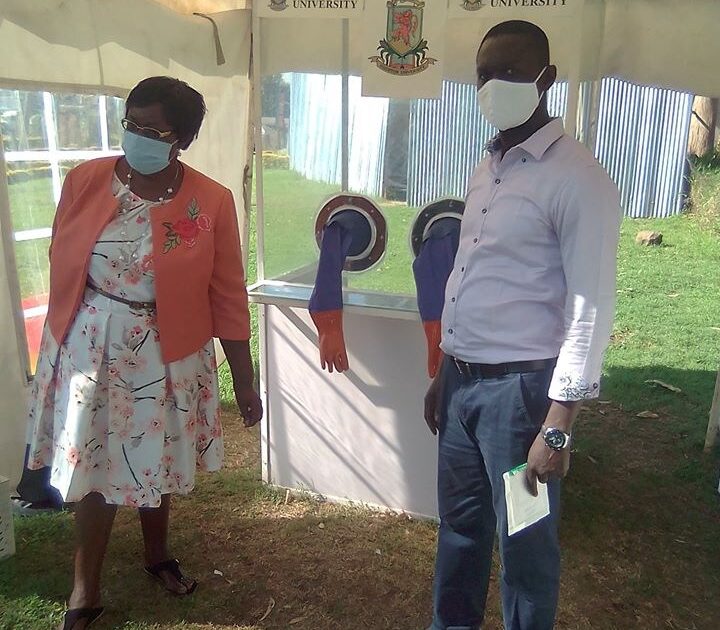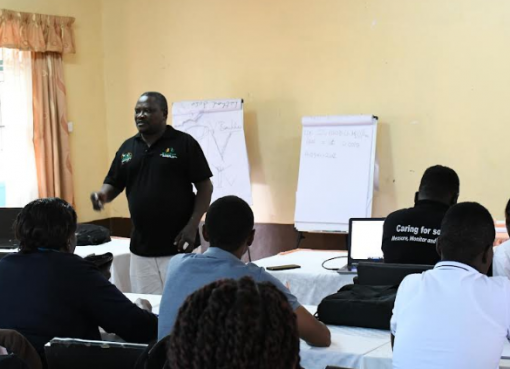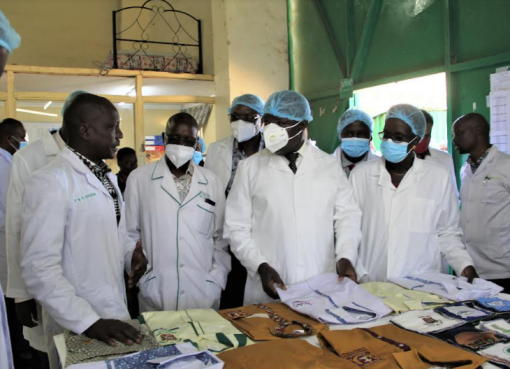As the World marks the International Youth Day amidst suffocating joblessness in Kenya, experts have
challenged young persons to come up with innovative ideas and enrich existing ones through invention of
products and services linked to the fight against Covid-19.
The Head of the Directorate of Marketing and Resource Mobilization at Egerton University, Prof. Joshua
Ouma Omollo said the unprecedented manner in which Kenyan inventors and researchers were responding to
the pandemic was an indication that there ‘was a silver lining’ as far as innovation and inventiveness is concerned.
“While pandemics always impact our lives negatively, history shows that such crises often act as inspiration for innovation. We are urging our youth to become more creative and seize business opportunities that this scourge has exposed.
Here at Egerton University, the Department of Chemistry is producing hand-rub sanitizers for the
benefit of the community, while the Department of Applied Community Development Studies is designing
and making face masks for students, staff, and the neighbouring community. These are areas we want our
unemployed youths to tap into,” noted Professor Omollo.
The don said young Kenyans graduating from Technical Vocational Education Training Institutions (TVETS)
and Universities should join those in the informal sector at increasingly looking at the pandemic
through the lens of engineering.
“It is a win-win situation, jobs are created for youth and home-based innovative interventions are
formulated to check socio-economic Covid-19 shocks,” he offered.
Speaking to Kenya News Agency, Prof. Omollo stated that at least one in every three Kenyan youths is
jobless. He said new unemployment data indicates that more than four million youths have no jobs.
Statistics released by the Kenya National Bureau of Statistics (KNBS) indicate that 4,066,362 or 34.27
per cent of the 11.8 young Kenyans were jobless as of December last year.
The pandemic he said had made the University realize that it was not making full use of its resources
at the School of Distance Learning (SoDL).
“The University approached the Kenya Education Network Trust (KENET) to train lecturers on the use of
their online teaching and learning system. With the Covid-19 pandemic still raging on, online content
consumption has increased multifold and is now greater than ever. This is an area where our youth can
make a financial kill”, explained Prof. Omollo.
On innovation, the Head of Marketing and Resource Mobilization noted a young scientist at Egerton
University from the Department of Industrial and Energy Engineering, Dr. George Owino had developed a
COVID-19 sample collection booth that allows people to get tested but without being in direct contact
with medical professionals.
The booth made of a transparent plastic and embedded sealed with rubber gauntlet gloves and enables
medics to collect nasal and throat samples contact-free was donated to Nakuru Level 5 Teaching and
Referral Hospital.
He said the world was increasingly becoming accustomed to reports about innovative interventions in the
medical world undertaken by African researchers, scientists and artisans working within ‘very limiting’
circumstances but producing ‘very remarkable’ products.
“In April this year, Kenyan university announced that its researchers had developed a prototype of a
ventilator that could be used to support patients who have difficulty breathing and consequently
support them in the fight against the virus.
Also, ordinary Kenyans with the requisite technical knowhow, from all parts of the country, are mass-
producing and distributing face masks for use against the virus by members of the public,” he
explained.
Elsewhere, Governor Lee Kinyanjui has taken the fight against Covid-19 to new levels by activating the
production of 10,000 face masks per week by youth at its vocational training centres.
He further said the two local factories had created 700 new job opportunities for the youth after
venturing into manufacture of face masks and other Personal Protection Equipment.
Bedi Investments Limited, located in Nakuru Town, and Trendy Links Limited based in Bahati Sub-county
have been turned into 24-hour production houses where at least 80,000 masks are being produced in a day.
Governor Kinyanjui said Bedi garment factory which was last year involved in the production of the new
police uniforms is now producing at least 60,000 face masks whereas Trendy Links can generate up to
10,000.
The Trendy Links Limited Managing Director, Esther Kimani said she had hired 400 new employees while Bedi
Investment Company Chief Executive Officer, Jaswinder Bedi said the venture had created 300 new jobs.
“We are proud of local companies producing the masks and other PPEs as they have created employment
opportunities for the youth. We support and promote local industries by offering them a conducive
business environment,” said governor Kinyanjui.
The County Director of Vocational Training, David Mwangi said the main centre of mass production of face
masks is at Nakuru Youth Polytechnic.
Other production centres in the region are in Chemare (Kuresoi North), Cheptuech (Kuresoi South), Molo
Vocational Training Centre, Njoro Vocational Training Centre, Barut (Nakuru West), Kagoto (Bahati),
Muteithia (Naivasha) and Rongai Vocational Training Centre.
Mwangi said the department is optimistic of meeting its target as it is using its skilled staff,
trainees and hired experts in the production of the masks.
At Nakuru Polytechnic, there are 30 workers while in Barut, Njoro, Molo and Kagoto there are about 10
personnel in each station.
In Chemaner there are eight workers, Cheptuech (seven), Muteithia (nine) and Rongai (eight).
“The beauty of this initiative is that we have hired our former trainees and this goes on to prove that
our training standards are top notch,” said Mwangi.
He assured the residents of Nakuru that the face masks have been approved by the Kenya Bureau of
Standards.
“The masks are made according to standards as set out by World Health Organization (WHO) and our staff
have undergone a special training organized by the Public Health department to ensure quality and
standards are not compromised,” said Mwangi.
By Anne Mwale





